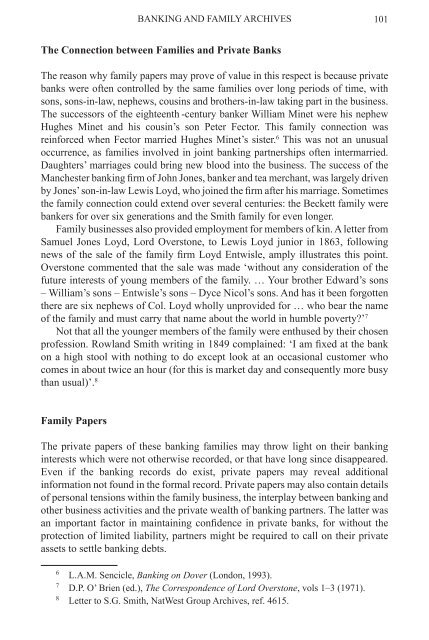the world of private banking
the world of private banking
the world of private banking
You also want an ePaper? Increase the reach of your titles
YUMPU automatically turns print PDFs into web optimized ePapers that Google loves.
BANKING AND FAmILy ARcHIVES 101<br />
The Connection between Families and Private Banks<br />
The reason why family papers may prove <strong>of</strong> value in this respect is because <strong>private</strong><br />
banks were <strong>of</strong>ten controlled by <strong>the</strong> same families over long periods <strong>of</strong> time, with<br />
sons, sons-in-law, nephews, cousins and bro<strong>the</strong>rs-in-law taking part in <strong>the</strong> business.<br />
The successors <strong>of</strong> <strong>the</strong> eighteenth -century banker William Minet were his nephew<br />
Hughes Minet and his cousin’s son Peter Fector. This family connection was<br />
reinforced when Fector married Hughes Minet’s sister. This was not an unusual<br />
occurrence, as families involved in joint <strong>banking</strong> partnerships <strong>of</strong>ten intermarried.<br />
Daughters’ marriages could bring new blood into <strong>the</strong> business. The success <strong>of</strong> <strong>the</strong><br />
Manchester <strong>banking</strong> firm <strong>of</strong> John Jones, banker and tea merchant, was largely driven<br />
by Jones’ son-in-law Lewis Loyd, who joined <strong>the</strong> firm after his marriage. Sometimes<br />
<strong>the</strong> family connection could extend over several centuries: <strong>the</strong> Beckett family were<br />
bankers for over six generations and <strong>the</strong> Smith family for even longer.<br />
Family businesses also provided employment for members <strong>of</strong> kin. A letter from<br />
Samuel Jones Loyd, Lord Overstone, to Lewis Loyd junior in 1863, following<br />
news <strong>of</strong> <strong>the</strong> sale <strong>of</strong> <strong>the</strong> family firm Loyd Entwisle, amply illustrates this point.<br />
Overstone commented that <strong>the</strong> sale was made ‘without any consideration <strong>of</strong> <strong>the</strong><br />
future interests <strong>of</strong> young members <strong>of</strong> <strong>the</strong> family. … Your bro<strong>the</strong>r Edward’s sons<br />
– William’s sons – Entwisle’s sons – Dyce Nicol’s sons. And has it been forgotten<br />
<strong>the</strong>re are six nephews <strong>of</strong> Col. Loyd wholly unprovided for … who bear <strong>the</strong> name<br />
<strong>of</strong> <strong>the</strong> family and must carry that name about <strong>the</strong> <strong>world</strong> in humble poverty?’ <br />
Not that all <strong>the</strong> younger members <strong>of</strong> <strong>the</strong> family were enthused by <strong>the</strong>ir chosen<br />
pr<strong>of</strong>ession. Rowland Smith writing in 1849 complained: ‘I am fixed at <strong>the</strong> bank<br />
on a high stool with nothing to do except look at an occasional customer who<br />
comes in about twice an hour (for this is market day and consequently more busy<br />
than usual)’. <br />
Family Papers<br />
The <strong>private</strong> papers <strong>of</strong> <strong>the</strong>se <strong>banking</strong> families may throw light on <strong>the</strong>ir <strong>banking</strong><br />
interests which were not o<strong>the</strong>rwise recorded, or that have long since disappeared.<br />
Even if <strong>the</strong> <strong>banking</strong> records do exist, <strong>private</strong> papers may reveal additional<br />
information not found in <strong>the</strong> formal record. Private papers may also contain details<br />
<strong>of</strong> personal tensions within <strong>the</strong> family business, <strong>the</strong> interplay between <strong>banking</strong> and<br />
o<strong>the</strong>r business activities and <strong>the</strong> <strong>private</strong> wealth <strong>of</strong> <strong>banking</strong> partners. The latter was<br />
an important factor in maintaining confidence in <strong>private</strong> banks, for without <strong>the</strong><br />
protection <strong>of</strong> limited liability, partners might be required to call on <strong>the</strong>ir <strong>private</strong><br />
assets to settle <strong>banking</strong> debts.<br />
<br />
L.A.M. Sencicle, Banking on Dover (London, 1993).<br />
<br />
D.P. O’ Brien (ed.), The Correspondence <strong>of</strong> Lord Overstone, vols 1–3 (1971).<br />
<br />
Letter to S.G. Smith, NatWest Group Archives, ref. 4615.












![[Pham_Sherisse]_Frommer's_Southeast_Asia(Book4You)](https://img.yumpu.com/38206466/1/166x260/pham-sherisse-frommers-southeast-asiabook4you.jpg?quality=85)



